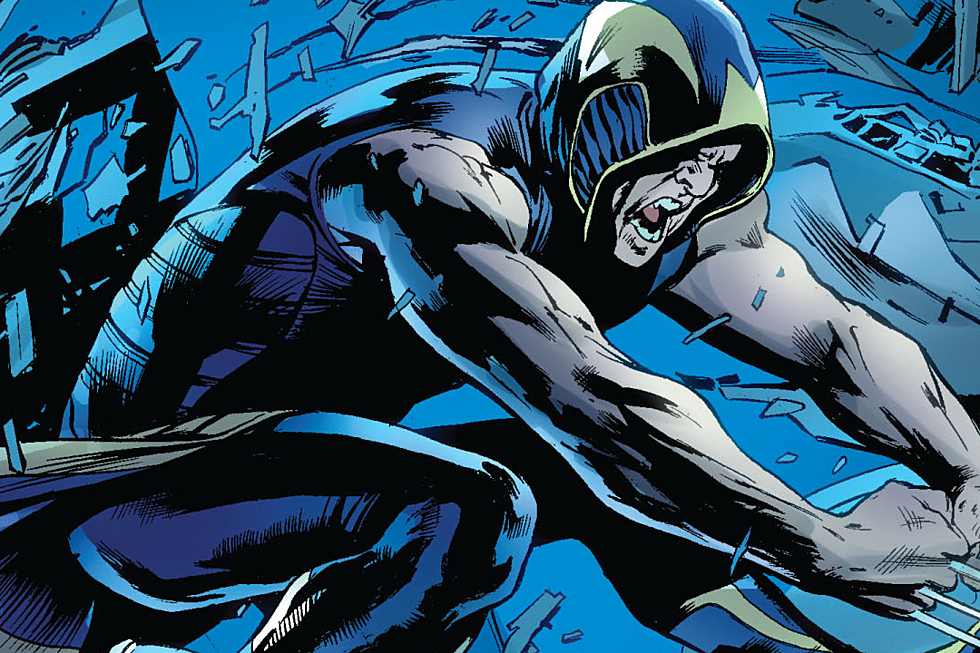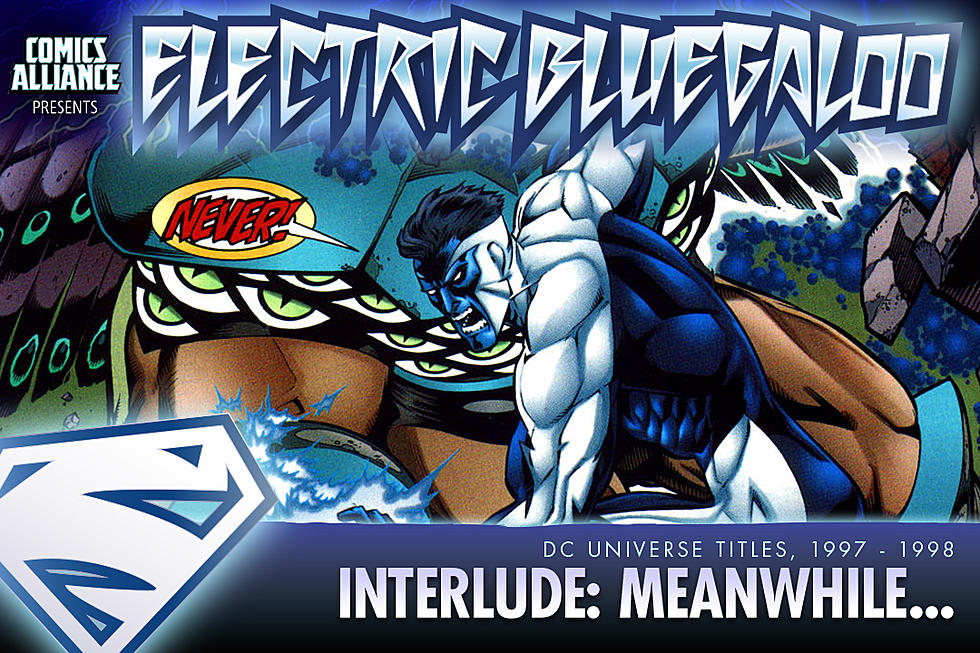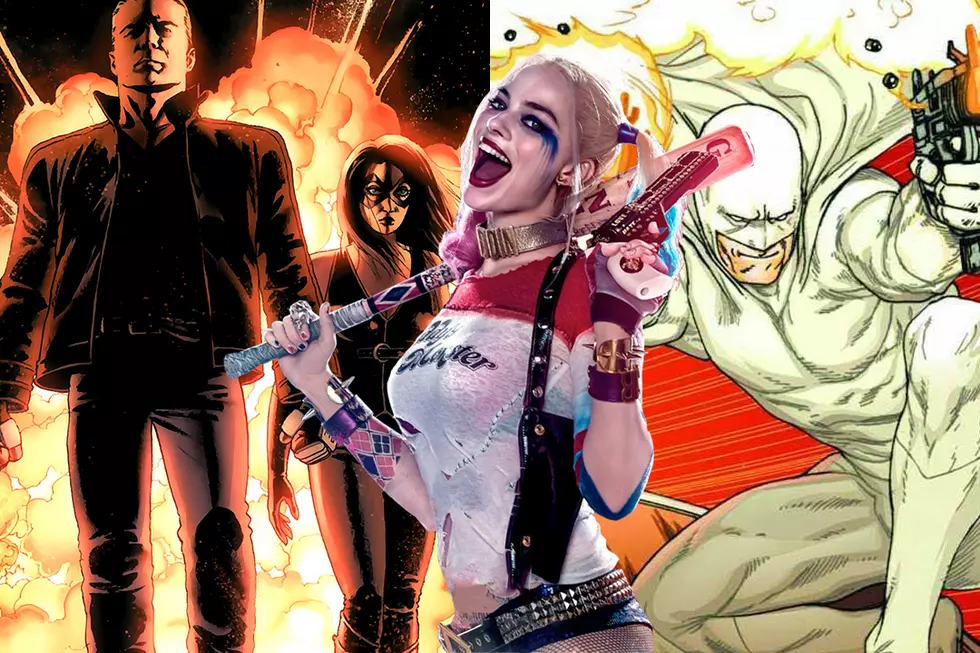
Rediscovering The Best Version Of Mark Miller In ‘Starlight’ With Goran Parlov
When Mark Millar and Goran Parlov's Starlight was announced, I had mixed feelings. Goran Parlov may be one of the five best comics artists living today, and it sounded like a good idea: a retired hero in the mold of John Carter returns to the planet he once saved, decades after his prime, to be a hero once again.
But often it seems that no matter how good an idea is, Mark Millar can't help but screw it up. His love of sensationalism and his need to be controversial have sapped the power out of many of his strongest ideas, and I wasn't that surprised when our own Kevin Church ripped the first issue to shreds. I read it anyway, because Goran Parlov exists, and life is much better for it.
I was a little surprised to find out that I totally disagreed with Church's review. And I was shocked that the Mark Millar that I like actually decided to turn up.
Millar's most discussed quality as a writer is his desire to be "sensational." Though he knows how to craft a compelling plot and never seems to lack interesting ideas, his compulsion towards "controversy" and over-the-top self-promotion has made him one of the most aggravating writers in comics. More Millar comics have been ruined by these tics than I can count; books with intrinsically good ideas, surprising twists, and inventive action sequences, but dragged down by elements that seem designed solely to make readers cringe at his depictions of sex and violence with a cynical, almost nihilistic deconstructionism. With Kick-Ass, Nemesis, Wanted, Hit-Girl, and all the other titles related to ultra-violence, it's got to the point where you have to wonder if the writer's lost the line between marketing and writing.
You many might say similar things about Garth Ennis, Warren Ellis, and others of their generation, but there are specific and fundamental differences between Millar and these writers. They make controversial choices because they make sense within the stories they're telling. Their choices don't seem manufactured in order to drum up buzz or fit into some kind of starling elevator pitch like "Imagine Batman... but he's a pederast!" Simply put; they're much better at this.
However, there's nothing wrong with heightened levels of violence in fiction, the introduction of sexual themes, extreme humor, or the injection of a healthy amount of cynicism. The only thing that really matters is whether or not it serves the story -- in so many of Millar's books, it detracts from it. While I'm not always fond of Ennis' particular brand of sh*t, dick, and handicapped jokes, they don't take you out of the story -- in many cases (but not always) they add to it. Herr Starr in Preacher is a perfect example: yes, he looks like a penis. Like, exactly like a penis. On one level that's juvenile and stupid, and hilarious, but it also adds to the reader's understanding of the character and how he interacts with the world. Literally, Starr is a dick: evil, venal, and disgusting, and deserving of every terrible thing that happens to him.
Conversely, a giant, veiny member that makes a cameo in Mark Millar and Tony Harris's War Heroes was apocalyptically awful, really stupid, completely pointless, hopelessly distracting, and not funny. It helps if the funny stuff is actually funny.
Also like Ennis and Ellis, Millar indulges in ultra-violence, but unlike them, the impact of that violence and its effect on his characters is barely, if ever, explored. (He touches on it very, very lightly in Kick-Ass.) And despite his undeniable talent for breaking down genres and characters into interesting new permutations, he rarely does anything interesting with it, instead going for controversy almost arbitrarily. Quicksilver and Scarlet Witch as incestuous lovers? Sure, why not? It's only meaningless and distracting, and adds absolutely nothing to the characters. What's the harm?
What makes these Millar qualities annoying and not just reasons to dismissive him completely is the fact that he knows how not to do indulge them. Indeed, Millar is at his best when he's not trying to be controversial. Without a doubt, the best book in Millar's bibliography is his run on Superman Adventures, the comic tie-in to Superman: The Animated Series. Before Millar cultivated his reputation as comics' bad boy, he penned one of the best Superman comics of the 1990s, a gleeful reconstruction of the Man of Steel that belied a true affinity for the character and a truly heroic heart.
In that same vein, Superman: Red Son, Ultimate Fantastic Four, regular Fantastic Four, and Superior are all heartfelt, uplifting, and earnest; polar opposites of artificially cynical comics like Wanted, Kick-Ass and Nemesis. Though he's had moments of awesomeness among his darker comics -- Old Man Logan, The Authority, and Civil War, all as flawed as they are enjoyable -- it's when he gives up his desire to shock you that Miller tells his best stories.
With Starlight, that's the Millar we get. Eschewing fake cynicism and the compulsion to sell comics by scandalizing his reader, he focuses on telling a good story about youth and age, second chances, and the great adventure of life.
Duke McQueen is a hero who fits squarely into the lineage of sci-fi and space adventurers. An American Air Force pilot transported to the faraway planet of Tantalus, where he overthrew an evil dictator and released an entire world from bondage. Unlike John Carter, Buck Rogers, Flash Gordon, and Adam Strange, he returned home to marry the woman he loved.
For thirty-eight years, Duke and Joanne were happily married, with her being the only person in the world who believed his faraway exploits, including his own sons. After Joanne dies, Duke is left to spend the rest of his days completely alone and rot away -- but on the first anniversary of her passing, a starship appears to take him back to Tantalus to overthrow a new threat.
Even though it's a familiar premise -- essentially, John Carter meets The Incredibles -- Starlight's themes of the acceptance of death and continuance of life merge so perfectly with the genre, it feels like something new.
Millar is happy to use archetypes to tell his stories, and he doesn't buck that trend in Starlight, but Duke McQueen is probably the best character Millar has ever created. He's certainly the most sympathetic, and though his familiarity to other heroes we know much more intimately may not make him very three-dimensional, he's definitely got a strong two dimensions.
Millar also doesn't delve that deeply into emotional fare, and he doesn't drop that habit here either, but there are several quick, emotional punches in Starlight that you won't see coming. The sequence involving Joanne's death manages to cram all the bittersweet feelings from the first ten minutes of Pixar's Up into just a few muted, evocative panels delivered masterfully by Parlov.
And despite the sci-fi/fantasy genre and the touchy-feely (or, if you prefer, not clinically insane) stuff, Starlight is not an all-ages title. It's closer to a PG-13, for Duke's smoking, mild obscenity, and the badass ways in which he dispatches a despotic regime. While the softer side of Millar is steering Starlight, the violence in the book is still pretty sharp. Heads explode, dudes get sliced in half by lasers, and quite a few people die. Unlike many other Millar books, though, the level of violence never gets pointlessly absurd, and it actually makes sense within a story that's about life and death.
Of course, none of this would be possible if not for Goran Parlov. Though he had already established himself as one of the most skillful artists in comics with work like Punisher MAX and Fury: My War Gone By, Starlight has to be his pinnacle thus far. One of Millar's greatest assets is his ability to match artists with projects and let them do the heavy lifting, and it's hard to think of a better marriage than Parlov and this subject matter. I'm not familiar with his European stuff, but Parlov had never done a sci-fi adventure for American comics, and clearly, American comics made a grievous error.
Parlov is so adept at this genre, you'd think it's all he's ever done. With the setting of an alien world to play with, Parlov displays the full potential of his skills for architecture and character design. Loops and curls wind their way into every exquisite aspect of old Tantalus, a beguiling and exotic world of peril. After Duke returns, it's all the hard angles of despotism and desolation, mirroring Duke's own journey from youth to old age.
Parlov cleverly references several classic sci-fi artists in his designs: the ship that picks Duke up from Earth is a sleek swordfish, like the kind Alex Raymond favored; the background characters look like extras from Moebius' Arzach; Duke's spacesuit is reminiscent of early Flash Gordon designs.
With an uncanny sense of negative space and a leisurely line, Parlov's pages are uncluttered and elegant. Like most Millar-written comics, Starlight has a low panel-per-page count and is fairly light on dialogue, and Parlov takes full advantage with wide-lensed horizontal panels and towering splash pages, while his nuanced character work keeps you emotionally invested. For Millar's script to work, you really need to like Duke, and Parlov gives him all the pathos you need in the first issue. As Duke heads to his wife's funeral, Parlov cycles through several subtle changes in expression, evoking sadness and regret and bewilderment with those oddly soulful eyes, and you really can't help but buy into it.
Clearly, I did. The penultimate issue, Starlight #5, is on sale now, and unless something truly awful and ridiculous happens to ruin everything that came before -- always a possibility -- Starlight will conclude as one of the best limited series of the year. Without a doubt, it's the best thing Millar has written in years, and proof that when teamed with a great artist like Goran Parlov and when focused on his heroes, stories, and writing from the heart, he can, when he wants to, live up to his position as one of Western comics' most popular authors.
More From ComicsAlliance









